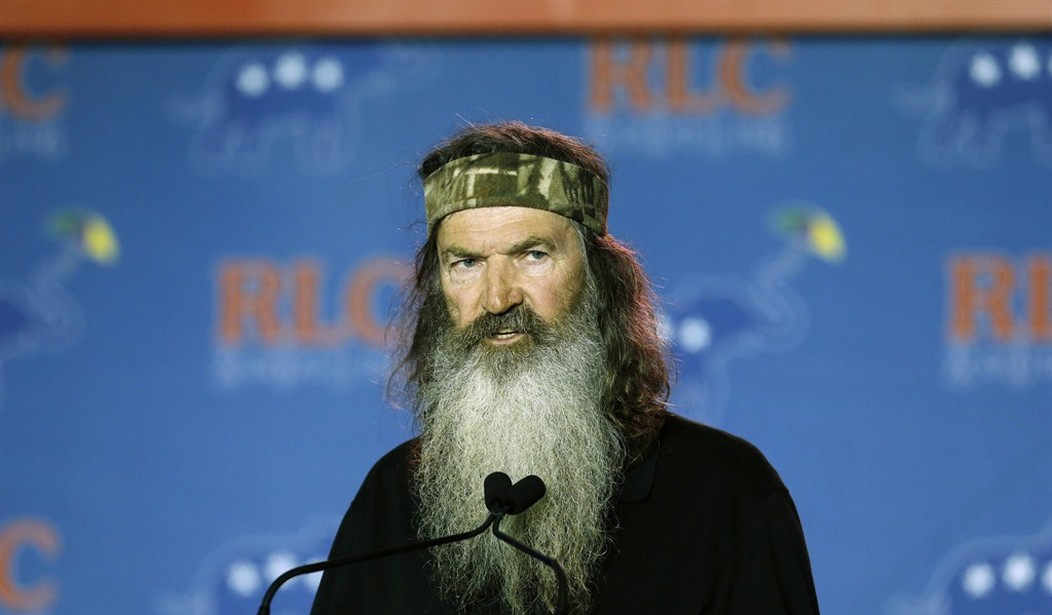I was never much of a “Duck Dynasty” fan. I tried to get into it since it was very popular with the men at my church then. I didn’t hate the show; it just never resonated with me, which is fine. Not everything is for everyone, and it is a uniquely 21st-century conceit that every program, movie, article, and social media post must be tailored to meet every person’s desires.
When the news broke over the weekend that the family patriarch Phil Robertson passed away, I noticed that it did not take long for the usual suspects to rise up and begin rejoicing over the death of a transphobe, homophobe, racist, sexist…you know the drill. This was to be expected, and it is reasonable to assume the attacks have only picked up on certain websites and media outlets. Some of this is attributable to Robertson’s comments about homosexuality at the height of “Duck Dynasty’s” fame, which got him banished from the show for a time. Robertson was never known for mincing words, and his comments to GQ raised quite the uproar. That some segments of society would continue to hold a grudge is unsurprising, since there is still some mileage for them to get out of his words. The original GQ piece was not available, but there was a 2013 article on the site about the interview:
A&E network has given Duck Dynasty dad Phil Robertson an indefinite suspension for his comments about homosexuality in a GQ January issue story about the family. The comment that sparked controversy, and earned the Duck dad his suspension, was an answer to the question, "What, in your mind, is sinful?" To which Robertson said: "Start with homosexual behavior and just morph out from there. Bestiality, sleeping around with this woman and that woman and that woman and those men." Robertson also questioned the logic of same-sex attraction, saying, "It seems like, to me, a vagina—as a man—would be more desirable than a man’s anus."
On the face of it, Robertson could have been a bit more genteel in his choice of words: honey vs. vinegar and all that. But it was not just his vocabulary that ruffled feathers; it was the idea that he called certain behaviors sinful. Perhaps in his own way, Robertson was mulling over Chesterton’s fence.
Thus, the legacy of Phil Robertson is still enraging people to this day.
I was working part-time in a Christian bookstore when the Robertson fad started to wane. There were still plenty of core viewers of “Duck Dynasty,” but overall, people were not as fascinated by it as they had originally been. So for a time, the legacy was a collection of shirts, accessories, and even beach towels featuring Uncle Si and his tea cup. Much of it was piling up at retail outlets, including the one where I worked. And then there were the books. It seemed like just about every member of the Robinson family had signed a book deal, so crates of the latest offerings regularly appeared at the store. My job was to play a version of Tetris in which I attempted to figure out how I was going to fit them all onto the already-overcrowded shelves. But I am not speaking of the merchandise legacy, the follow-up show on Fox, or the podcasts by various family members.
Phil Robertson’s legacy is an uncomfortable one. I watched him deliver speeches and sermons and tell and re-tell his story. When Robertson spoke of sin, he knew whereof he spoke. While he was an outspoken Christian later in life, that was preceded by a life of alcoholism, partying, abandoning his family once, violence, and infidelity. It was a life marked by sin. When Robertson spoke about sin, it was not as one who came from a place of pseudo-perfection. Robertson had believed he was perfectly happy in his life of sin for years before coming to Christ, and it may have been a hard landing. And he was never shy about talking about his life before his transformation. He was brutally honest about who he was and what he did. He never pulled any punches.
Robertson crawled through the garbage, and when he spoke, it was from experience. It was a warning. A wise person once said, “The hypocrite says ‘Do as I say, not as I do.’ The teacher says, ‘Do as I say, not as I did.’”
Socrates said, “The unexamined life is not worth living.”
We live in an era in which people expect everything they say, do, write, believe, or post to be heralded as true, even if it is destructive and degrading to oneself or others. We prefer to baptize our demons as angels and go our merry way, believing ourselves to be justified in whatever motivates us at the moment. Sin takes more forms than sexual proclivity and substance abuse, and while we are delighted to judge one another, we would prefer not to focus the microscope on ourselves. Robertson looked his demons in the eye and saw them for what they were. He then chose to reject them. His road back was not easy, but it was worth the trip. And everyone needs to travel that road at some point. As harsh as his rhetoric sounded to some, Robinson made a point of showing the world his battle scars. Lost in the criticism of his faith and his comments is the fact that, in contrast to going to the mountaintop, Robinson started in the gutter, and he knew what lurked there. He found a way out and wanted to tell others how he accomplished it.
Not everyone’s way out will be exactly the same as Robertson’s. That said, there are few, if any of us, no matter our beliefs, orientation, or lifestyle, who do not need to take a critical inventory of ourselves, despite the fact that we may not like what we see.
Phil Robertson and I would probably have differed on various points of theology, Christology, and soteriology, not to mention public speaking. We would probably have differed on a whole host of subjects. That aside, Robertson experienced the wages of sin and wanted to spare others those wages if he could. He used his life as an example for others. He never held himself up as an ersatz saint but as a redeemed sinner, and that is what he should be remembered for.








